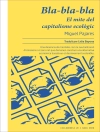The environmental crisis under way is unique in human history. It is a true existential crisis. Those alive today will decide the fate of humanity. Meanwhile, the leaders of the most powerful state in human history are dedicating themselves with passion to destroying the prospects for organized human life. At the same time, there is a solution at hand, which is the Green New Deal. Putting meat on the bones of the Green New Deal starts with a single simple idea: we have to absolutely stop burning fossil fuels to produce energy within the next 30 years at most; and we have to do this in a way that also supports rising living standards and expanding opportunities for working people and the poor throughout the world. This version of a Green New Deal program is, in fact, entirely realistic in terms of its purely economic and technical features. The real question is whether it is politically feasible. Chomsky and Pollin examine how we can build the political force to make a global Green New Deal a reality.
Sobre el autor
Robert Pollin is Distinguished University Professor of Economics and Co-Director of the Political Economy Research Institute (PERI) at the University of Massachusetts-Amherst. He is also the founder and President of PEAR (Pollin Energy and Retrofits), an Amherst, MA-based green energy company operating throughout the United States. His books include The Living Wage: Building a Fair Economy (co-authored 1998); Contours of Descent: U.S. Economic Fractures and the Landscape of Global Austerity (2003); An Employment-Targeted Economic Program for South Africa (co-authored 2007); A Measure of Fairness: The Economics of Living Wages and Minimum Wages in the United States (co-authored 2008), Back to Full Employment (2012), Greening the Global Economy (2015), and Climate Crisis and the Global Green New Deal (co-authored 2020). He has worked as a consultant for the U.S. Department of Energy, the International Labour Organization, the United Nations Industrial Development Organization and numerous non-governmental organizations in several countries and in U.S. states and municipalities on various aspects of building high-employment green economies. He has also directed projects on employment creation and poverty reduction in sub-Saharan Africa for the United Nations Development Program. He has worked with many U.S. non-governmental organizations on creating living wage statutes at both the statewide and municipal levels, on financial regulatory policies, and on the economics of single-payer health care in the United States. In 2018, he co-authored Economic Analysis of Medicare for All. Between 2011- 2016, he was a member of the Scientific Advisory Committee of the European Commission project on Financialization, Economy, Society, and Sustainable Development (FESSUD). He was selected by Foreign Policy magazine as one of the ‘100 Leading Global Thinkers for 2013.’












